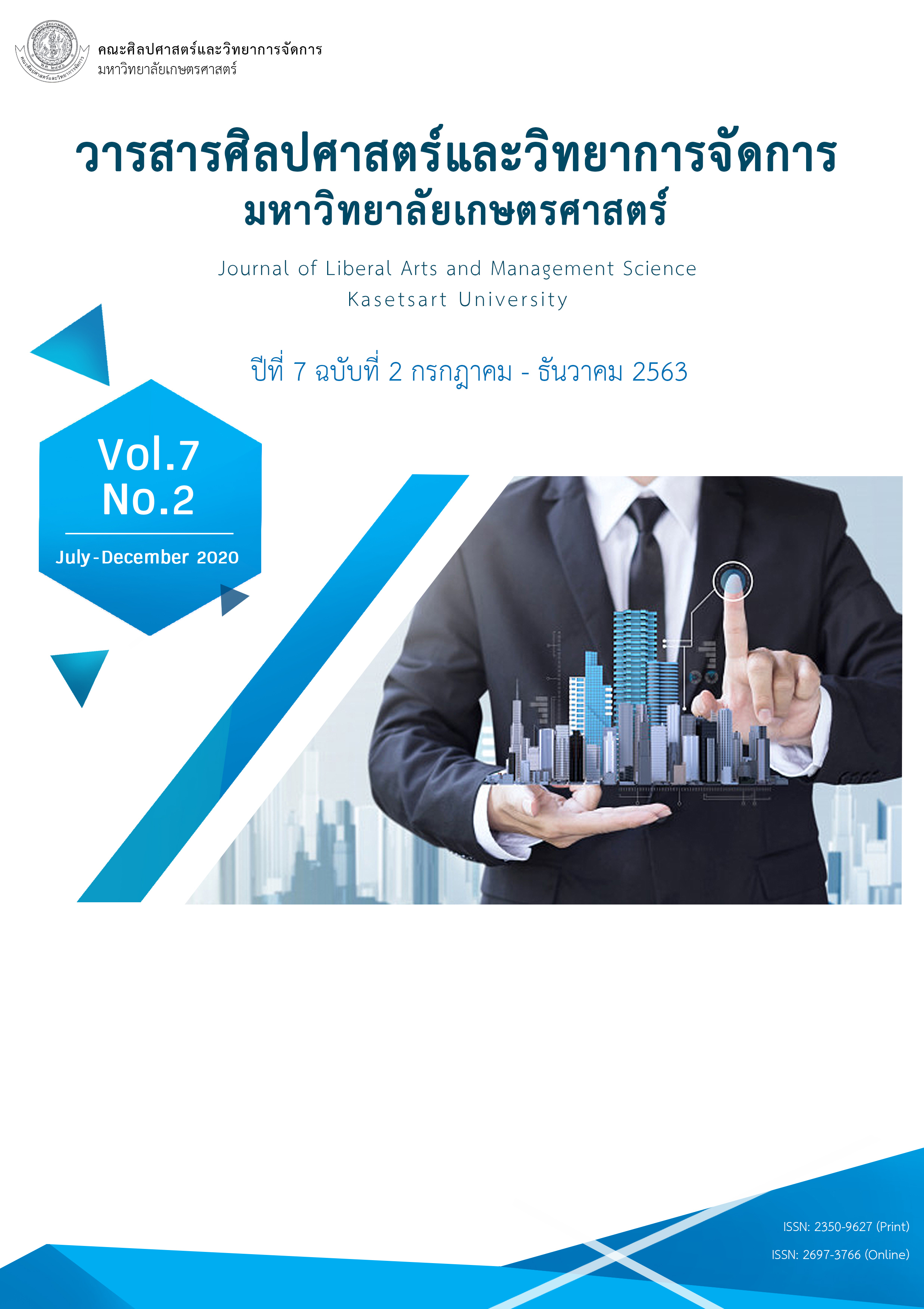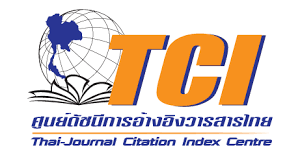การวิเคราะห์การมีส่วนร่วมและทัศนคติต่อกิจกรรมพัฒนาการท่องเที่ยวชุมชนแบบมีส่วนร่วม ชุมชนบ้านท่าคอย อำเภอศรีประจันต์ จังหวัดสุพรรณบุรี
คำสำคัญ:
การวิเคราะห์การมีส่วนร่วม, การพัฒนาการท่องเที่ยวชุมชน, การวิเคราะห์ชุมชนแบบมีส่วนร่วมบทคัดย่อ
การวิเคราะห์การมีส่วนร่วมและทัศนคติต่อกิจกรรมพัฒนาการท่องเที่ยวชุมชนแบบมีส่วนร่วม
เป็นเครื่องมือวิเคราะห์ปัญหาและอุปสรรค เพื่อนำมาสู่การแก้ไขปัญหาและขับเคลื่อนการพัฒนาการท่องเที่ยวชุมชน ศึกษาโดยประยุกต์การวิจัยเชิงปฏิบัติการแบบมีส่วนร่วม แบ่งเป็น 2 ขั้นตอน ได้แก่
การเตรียมปฏิบัติการ และ การสรุปผล รวบรวมข้อมูลเชิงปริมาณด้วยแบบสำรวจ จากสมาชิกชุมชน 351 คน ข้อมูลเชิงคุณภาพรวบรวมด้วยการสัมภาษณ์เชิงลึก การประชุมกลุ่มย่อย และการสังเกตแบบมีส่วนร่วมจากผู้ให้ข้อมูลหลัก ได้แก่ ผู้นำ แกนนำ และสมาชิกชุมชน จำนวน 35 คน วิเคราะห์ข้อมูลเชิงปริมาณด้วยสถิติพรรณนา ข้อมูลเชิงคุณภาพวิเคราะห์ด้วยการวิเคราะห์เชิงเนื้อหาที่ทำการตรวจสอบข้อมูลแบบสามเส้า นำเสนอแบบพรรณนาความ พบว่า ชุมชนบ้านท่าคอยเป็นชุมชนสมัยปลายอยุธยา ปัจจุบันเป็นแหล่งปลูกข้าวและเกษตรกรรมที่มีชื่อเสียง มีศักยภาพแหล่งการท่องเที่ยวระดับสูง เหมาะสมที่จะพัฒนาเป็นแหล่งท่องเที่ยวเชิงวัฒนธรรมชุมชนเกษตร อย่างไรก็ตามบทบาทการมีส่วนร่วมและทัศนคติต่อกิจกรรมพัฒนาการท่องเที่ยวของชุมชนแบบมีส่วนร่วมอยู่ในระดับปานกลาง และเป็นเพียงระดับการร่วมรับรู้ - ให้ข้อมูล สำหรับปัญหา/อุปสรรคสำคัญ ต่อการพัฒนากิจกรรมท่องเที่ยวชุมชนได้แก่ ปัญหาเศรษฐกิจในครอบครัว ทัศนคติต่อผู้นำและทีมนำด้านการท่องเที่ยว และ ปฏิสัมพันธ์กันของสมาชิกชุมชน ข้อเสนอแนะเพื่อนำไปแก้ไขปัญหาได้แก่ ใช้กระบวนการฉันทามติหาข้อตกลงในการมีส่วนร่วม การเปิดเผยข้อมูลเกี่ยวกับกิจกรรมการพัฒนาต่างๆ การประยุกต์ใช้กิจกรรมการขับเคลื่อนเชิงอนุรักษ์
เอกสารอ้างอิง
โฆสิต ปั้นเปี่ยมรัษฎ์. (2543). แนวทางแก้ไขปัญหาเศรษฐกิจ -การเมืองไทย. กรุงเทพฯ : สถาบันนโยบาย
ศึกษา.
นุชนาฎ เชียงชัย. (2558). การใช้อัตลักษณ์เพื่อการส่งเสริมการท่องเที่ยวของจังหวัดลำปาง. (วิทยานิพนธ์
บริหารธุรกิจมหาบัณฑิต, มหาวิทยาลัยศิลปากร).
เทิดชาย บำรุงสุข. (2552). บทบาทขององค์กรปกครองส่วนท้องถิ่นกับการพัฒนาการท่องเที่ยวอย่างยั่งยืน
บนฐานแนวคิดเศรษฐกิจพอเพียง. กรุงเทพฯ: วิทยาลัยพัฒนาการปกครองท้องถิ่น สถาบัน
พระปกเกล้า.
พลอยศรี โปราณานนท์. (2544). การท่องเที่ยวเบื้องต้น, เชียงใหม่, โรงพิมพ์มิ่งเมือง.
วีระพล ทองมา. (2556). การท่องเที่ยวโดยชุมชน (Community Based Tourism :CBT) สำหรับการ
พัฒนาคุณภาพชีวิตของชุมชนในเขตที่ดินป่าไม้. คณะพัฒนาการท่องเที่ยว มหาวิทยาลัยแม่โจ้. เชียงใหม่.
สุกัญญา ดวงอุปมา และ ไอลดา พหลทัพ. (2559) . ได้ทำการวิจัยเรื่อง การศึกษาทัศนคติและการมีส่วน
ร่วมในการจัดการการท่องเที่ยวในจังหวัดกาฬสินธุ์ : กรณีศึกษา ศูนย์วัฒนธรรมชาวผู้ไทบ้านโพน อำเภอ
คำม่วงจังหวัดกาฬสินธุ์. วารสารศรีนครินทรวิโรฒวิจัยและพัฒนา (สาขามนุษยศาสตร์และสังคมศาสตร์),
(15) มกราคม – มิถุนายน.
อินทิรา พงษ์นาค. (2558). อัตลักษณ์ชุมชนเมืองโบราณอู่ทองเพื่อพัฒนาการท่องเที่ยวเชิงวัฒนธรรม
จังหวัดสุพรรณบุรี. (วิทยานิพนธ์ศิลปศาสตรมหาบัณฑิต จุฬาลงกรณ์มหาวิทยาลัย).
McIntosh, Robert W; Goeldner, Charles R; & Ritchie, J.R. Brent. (1995). Tourism Principles,
Practices, Philosophies. USA.
Boonratana, R. (2010). Community-based Tourism in Thailand: The Need and Justification
for an Operational Definition. Kasetsart Journal Social Science, 31(2), 280-289.
Chankaew, K. (1996). Principles of watershed management. (Edition 2). Bangkok:
Department of Conservation, Faculty of Forestry. Kasetsart University, Thailand.
Chairoj, N. (1998). New Travel Management. TAT Review Magazine, 17(2), 12-18.
Choonwattana, B. (2000). Sustainable tourism development. Bangkok: WordPress.
Department of Tourism. (2015). Tourism Statistics 2015. Bangkok: Ministry of Tourism and
Sports, Thailand.
Department of Tourism. (2016). Tourism Statistics 2016. Bangkok: Ministry of Tourism and
Sports, Thailand.
Department of Tourism. (2017). Tourism Statistics 2017. Bangkok: Ministry of Tourism and
Sports, Thailand.
Hansapiromchoke, P. (2017). The Approach for Learning Processes Management for
Community Planning. Journal of Education Research, 11(1), 99-109.
Pholanan, T. (2002). Mind Map Work Shop. (Edition 2). Bangkok: Buzun centre Thailand.
Rattana, K. (2006). Participatory watershed management. Bangkok: Department of
Conservation, Faculty of Forestry. Kasetsart University, Thailand.
Tavorn, C. (2013). Social Power of Communities in Mangrove Forest Management, Paklok
Bay, Phuket Province, Thailand. Thesis of Doctor degree of Philosophy in Sociology, Khon
Kaen University, Khon Kaen.
Tourism Authority of Thailand. (2002). Development and tryout of a tourist's manual on
the cultural heritage. Bangkok: Ministry of Tourism and Sports, Thailand.
Wanichritta, T. (2007). Knowledge management in community: a case study of
ecotourism management by participation of the community, samut Songkhram province.
(Thesis of Master of Education, Silpakorn University).






